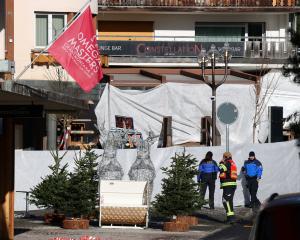
The wording below the Z on the Police helmets reads "We don't abandon our own".
This is perhaps a reference to Putin's public reason for the invasion, that it was necessary to protect Russian-speaking people, or to his previously stated aim to create a Greater Russia comprising all Russian speakers.
Yesterday, many St Petersburg residents went to the Nevesky Prospect, the main street of Russia’s second-largest city, but increased numbers of riot-gear-wearing Police kept most protesters from openly expressing their opposition to the three-week-old war, a Russian contact told the Otago Daily Times (ODT).
- 'This is not the people’s war': Protests continue in St Petersburg
- War in Ukraine: We will keep coming, Dunedin protester pledges
‘‘Protesters were afraid to show their opinion,’’ the contact said.
‘‘It was difficult to say who was a protester and who was just a tourist.
‘‘Police stopped young people and checked their mobile phones.’’
The letter Z is being used by Russian military invading Ukraine and by supporters inside and outside the country.
It is unclear how the Z, which is not a letter in the Cyrillic alphabet, came to be the insignia of the invasion nor its original meaning.
The Instagram account of the Russian Ministry of Defence has featured Z and V symbols with messages of ‘‘to victory‘‘ and ‘‘we finish wars’’.
The symbol has reportedly been painted on the doors of Russian dissidents, including Pussy Riot member Rita Flores, in an apparent attempt at intimidation.
Yesterday, the ODT’s St Petersburg contact was approached by one brave protester who asked the photographer to take his picture.

‘‘I asked him to walk a little bit with me, away from police . . . Police did not see it and he was not arrested.’’
The St Petersburg report of a tightening clamp-down by authorities, resulting in greater reluctance by opponents to risk imprisonment, matches reports from elsewhere in Russia.
Whereas last weekend, Police arrested more than 5000 protesters throughout Russia, this weekend OVD-Info, which monitors protest arrests, said fewer than 1000 were detained.
Since the February 24 invasion of Ukraine, more than 14,200 Russian anti-war protesters and several journalists have been arrested.












